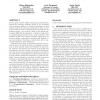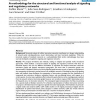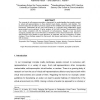241 search results - page 24 / 49 » Understanding Social Networks Using Formal Concept Analysis |
121
click to vote
ATAL
2009
Springer
15 years 9 months ago
2009
Springer
Several agent-oriented software engineering methodologies address the emerging challenges posed by the increasing need of adaptive software. A common denominator of such methodolo...
119
Voted
GD
2005
Springer
15 years 8 months ago
2005
Springer
A workshop on Network Analysis and Visualisation was held on September 11, 2005 in Limerick Ireland, in conjunction with 2005 Graph Drawing conference. This report review the backg...
139
click to vote
BMCBI
2006
15 years 2 months ago
2006
Background: Structural analysis of cellular interaction networks contributes to a deeper understanding of network-wide interdependencies, causal relationships, and basic functiona...
138
Voted
WWW
2008
ACM
16 years 3 months ago
2008
ACM
The success and popularity of social network systems, such as del.icio.us, Facebook, MySpace, and YouTube, have generated many interesting and challenging problems to the research...
120
Voted
PSYCHNOLOGY
2010
15 years 1 months ago
2010
The concept of self-presence provides a framework for understanding how people connect to virtual self-representations on three distinct levels (body, emotions, and identity). The...



